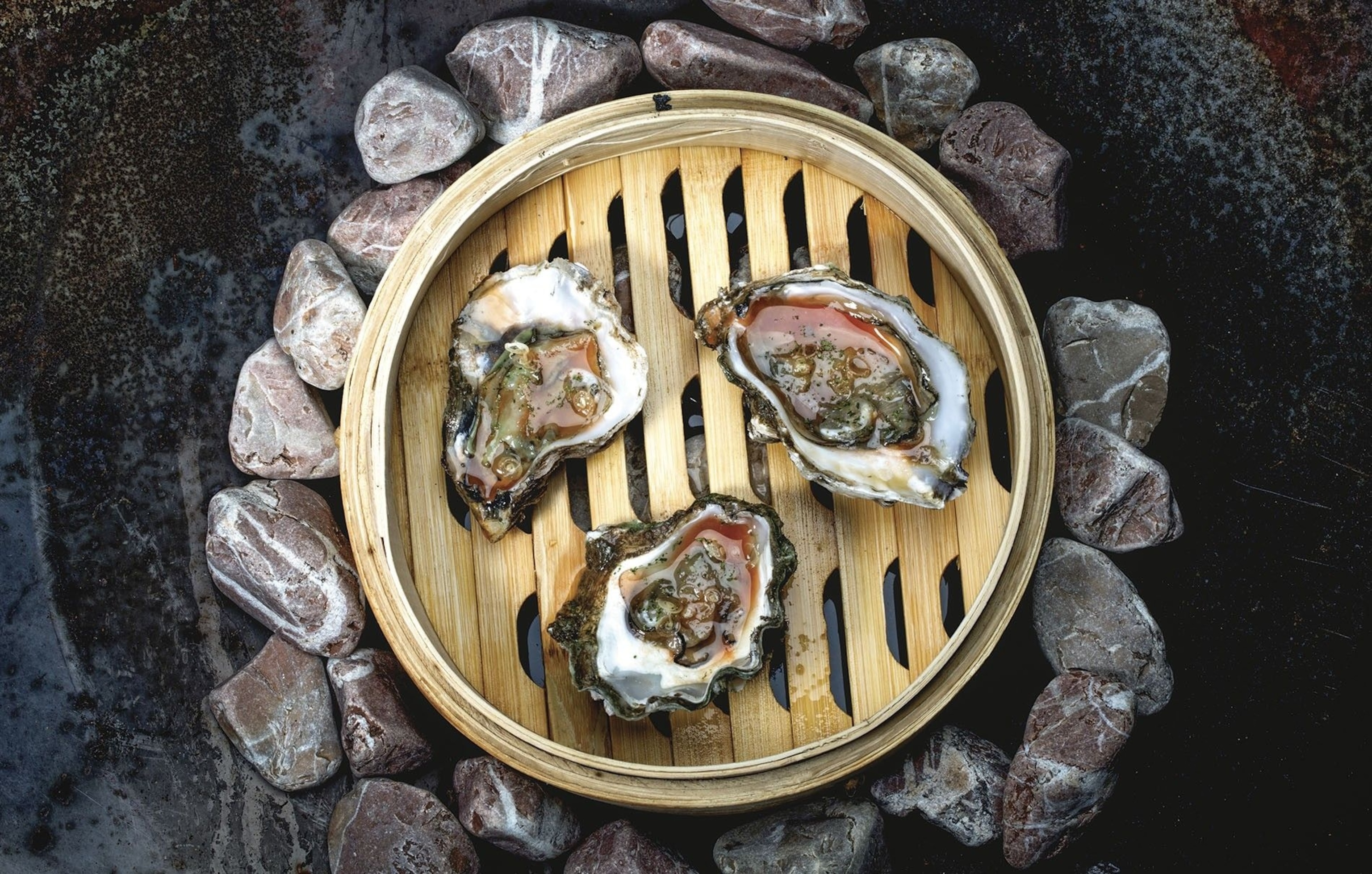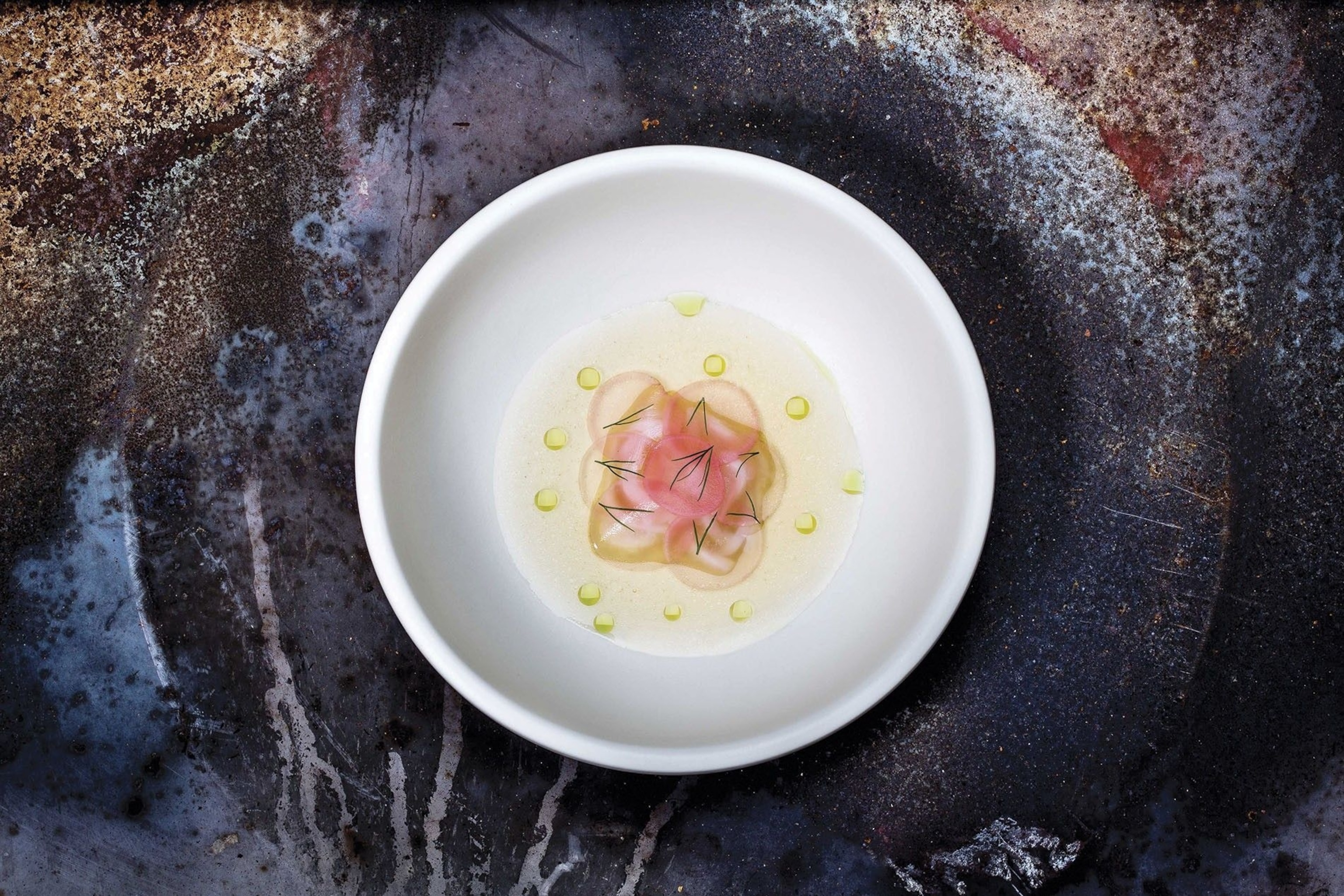
The pioneer: Alexandre Silva
Tradition looms large over the Portuguese food scene, but chef Alexandre Silva has other ideas. At his Lisbon restaurants, Loco and Fogo, he’s taking a creative new approach to time-honoured ingredients and techniques
For a restaurant named Loco, chef Alexandre Silva’s Michelin-starred Lisbon venture doesn’t seem particularly crazy. But then, that’s not what it’s about. “I want people to think [that’s where the name comes from],” Alexandre smiles. “But when they ask me, I tell the truth; it’s from Latin: ‘in loco’.” Meaning: local; in the proper and natural place.
In this case, the place is Portugal, a country whose cuisine is defined by its rugged landscape and coastline, where dishes such as carne de porco à Alentejana (black pork and clams) and bacalhau à brás (salt cod) are prepared with reverence. Alexandre sees things a little differently, though. “Portuguese cuisine is whatever comes from Portugal, and that’s it. Otherwise, there are no rules.”
In a land where tradition has sanctified the menu, it’s an almost radical proposition. Why, then, was one of Loco’s earliest dishes ‘scallops and caviar’? It doesn’t sound especially rule-breaking, but inevitably, there’s a twist. “When we opened, I promised I’d never work with scallops or caviar,” he says. “So we did a parody — cuttlefish from the coastal town of Peniche, presented in a scallop shell, on a bed of mustard seeds.” Those seeds were cooked nine times in salt water, pickled with sugar, rice vinegar and ink, then kept in a vacuum bag for two weeks before service. What you tasted was cuttlefish and pickle, but what you saw was something else.
It’s this playful, produce-driven approach, expressed in a regularly changing, ultra-seasonal menu, that’s earned Alexandre and his team their reputation — and that coveted star. But the journey wasn’t easy. Born among the vineyards and windmills of Abrigada, 40 miles north of Lisbon, at the head of the Serra de Montejunto range, Alexandre studied culinary arts in the capital before working in restaurants across Portugal and Spain. While in Lisbon, he entered and won Portugal’s edition of Top Chef in 2012; flush with victory, he decamped to a rural five-star resort nearly 100 miles east, in the Alentejo region. “A fancy restaurant with no clients,” he says. “I’m a dreamer, so I believed I could change things. But the truth wasn’t what I thought.”
Operating in the middle of the financial crisis and unable to convince the clientele of his dreams, the project failed. So, Alexandre took his ideas and team back to the city and started again. After a stint as head chef at the trendy Bica do Sapato, and the opening of his eponymous (still-running) stall at the Ribeira ‘Time Out’ Market, Loco was born in 2016. “But actually,” Alexandre says, “it started 11 years ago in my house. In my days off and holidays I ran a supper club, dinner for 10. I did everything I wanted, and I slept on the couch.”
The chef is now reaping the fruits of his labour. The idea of Loco is to tell the story of Portugal in new ways. “At the moment we have raw scarlet shrimp, but I like to improve flavours by adding something like garum [fermented fish sauce],” he says. “A raw product that we can improve, so the flavour is like a bomb.”

Often this creative process draws on international inspiration: “Two months ago we had a dish: Japan at Loco. Atlantic fish, sake made from Portuguese carolino rice, and yuzu from the Lugar do Olha Feliz citrus farm in Cercal.” Other times it’s closer to home — a cabbage and wood sorrel dessert, or a crab and radish pickle, perhaps. Even when tradition is employed, it’s in original forms. Take the escabeche that sous chef Ricardo Leite is working on as Alexandre and I talk. Combining vinegar, fat, olive oil, carrots, garlic, onion and bay leaf, it was a preservation method used during colonial times to feed ships’ crews, a technique inadvertently disseminated to the world. Now, via a rabbit escabeche taco, it’s returning in fine-dining form.
Haute cuisine, however, isn’t Alexandre’s only pursuit. He’s about to launch a new casual restaurant, Fogo (‘fire’ in Portuguese). “Big pans, big fires… everything cooked over the flame. Seafood, lamb, cow, pork, suckling pig. A big bar. It’s the perfect restaurant,” he laughs. It comes from a place of history and memory. “The restaurant was born in the time of Salazar [Portugal’s Prime Minister from 1932 to 1968]. The people were poor; they were cooking everything on fires.”
It’s something he wants to start a conversation about. “Everyone in Portugal knows how to start a wood fire; when you’re on holiday, everyone wants a barbecue on the beach, but no one [usually goes to restaurants] for that.” There’s personal history in his decision too. “I’ve worked with fire since I was 12,” he says, “it’s part of me. My grandfather was a man from the vineyards; we were always [there] and we always cooked with fire.”
The influence of Alexandre’s paternal grandfather and his passion for making fire from the wood of the vines lives on. It’s the chef’s preferred fuel — more so than, say, eucalyptus or pine. “A wood-fired oven with embers from the vineyard, it’s the best. It’s slow burning, like a cigarette,” he tells me.
Now, Alexandre has two distinct identities: one that produces avant-garde fine dining and the other that reveres the earthy, robust, rustic tradition of flame. Both, however, remain proudly Portuguese. “Six years ago, we didn’t [shout about Portuguese cuisine]. Now everyone wants to understand us better. Portuguese chefs travel around to talk about their country and its cuisine. But I don’t care if you have the best fish in the world — the important thing is to show it.”
So what does the future hold? Part of it involves expansion — Alexandre has plans to move Loco to a bigger location. “We have to catch up. We have time, but we need the space.” And as for chasing another Michelin star — he’s not saying no. “When we opened Loco we never thought about the stars, because we thought it was impossible. We do everything opposite of the Michelin guide. But in the first year, we won the star. Now I believe you can change things."

Alexandre’s tips: Cooking over fire
Build it up: When making an open fire, stack five logs in such a way as to let the air pass properly, and pile a few pinecones at the base — start with these when lighting the fire. Once the logs are completely burnt, spread the embers evenly and add more logs for a bigger flame. You’re now ready to cook.
Smoky flavour: To cook meat over a fire, hang it so
the flame never actually touches the flesh. Or, if the meat can’t be hung, make sure there’s a big gap between your grill and the embers. You want the smoke — rather than the flames — to cook and flavour the flesh. It’s also important to rotate the meat, to ensure it cooks evenly.
Variable heat: When cooking meat on a grill, give it a high temperature at first and then move it further from the heat; this will mean the meat remains juicy. It’s also important to let it rest after being cooked; this will allow it to retain the juices rather than them spilling out over the plate. All of this makes a big difference to the flavour.
Published in issue 5 of National Geographic Traveller Food
Follow us on social media
Twitter | Facebook | Instagram | Flipboard